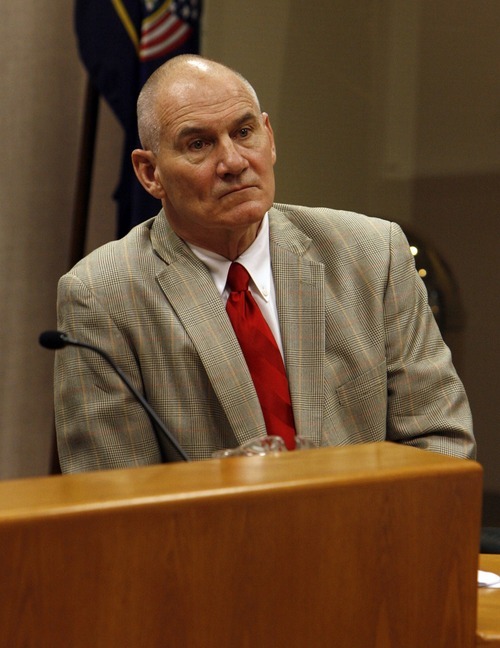This is an archived article that was published on sltrib.com in 2011, and information in the article may be outdated. It is provided only for personal research purposes and may not be reprinted.
Legislative auditors say the former executive director of the state liquor-control agency should be investigated by the state and face criminal charges for his role in $370,000 worth of business that was transacted between his department and a company owned by his son.
In a report released Tuesday, auditors said the Utah Department of Alcoholic Beverage Control (DABC), under Dennis Kellen's control, failed to get competitive bids and then paid premium prices for supplies, equipment and services provided exclusively by Flexpak, a Woods Cross-based company owned by Brian Kellen.
The report also criticized years of mismanagement within the department and recent executive perks such as custom furniture and a $20,000 Liberty Jeep for use by Dennis Kellen and Deputy Director John Freeman at a time when the state was considering closing liquor stores and laying off employees.
Freeman resigned Oct. 7. Four other agency employees have been laid off, one worker has been fired and several more are expected to retire.
For more than 20 years, the department has been documenting higher bids — after making purchases — auditors said. Employees were trained to find higher bids after receiving invoices for purchases already made, and to get verbal bids from vendors until a higher price was found, the report said. At times, the higher bids were obtained weeks after the purchases. Financial reports in turn, were routinely backdated to correspond to the day purchases were made.
Kellen, 68, who resigned in August, had worked at the agency for more than 30 years and had been director since 2007. He has not returned repeated calls for comment.
Auditors said Kellen may have violated the Employee Ethics Act, which states that a public employee may not use his official position to secure privileges for "himself or others." They turned the report over to the Attorney General's Office, asking that it investigate and consider possible criminal charges, which could include a second-degree felony, punishable by one to 15 years in prison and a fine of up to $10,000.
Whether charges would be considered against others in the agency will be determined by the A.G.
Sen. John Valentine, R-Orem, said incompetence and mismanagement detailed in the audit probably will prompt the Legislature to restructure the entire DABC, which has an annual budget of about $30 million as part of the state-run liquor monopoly. At this point, he said, "we're going to have to take some time to wrestle with some weighty policy issues." On Wednesday, copies of the audit will be presented to the Business and Labor Committee.
Commerce Department Director Francine Giani, named to replace Kellen on an interim basis after his departure, said "misconduct uncovered by this audit is appalling. Much of it also could have been avoided, prevented or repaired," she told the Legislative Audit Subcommittee Tuesday. "[The] record indicates a history of audits the DABC management apparently ignored. I do not believe that is appropriate or acceptable behavior for any state agency."
Responding to the audit, Gov. Gary Herbert said:
"Clearly, [it] demonstrates the need for a cultural overhaul at the DABC. The agency's independence has perpetuated a pattern of administrative misconduct, and it's time to implement controls that increase oversight and accountability. My administration is going to make sure that happens. Changing DABC management was just the first step."
Lack of financial control was particularly noticeable in the department's dealings with Flexpak, auditors said.
In a statement Tuesday, Brian Kellen said he had not seen the audit, but added:
"As I have previously stated, we believe we have complied with the procedures governing the sale of commodities and services to an agency of the State of Utah. Flexpak treated the Utah Department of Alcoholic Beverage Control like any of its 1,300 other valued customers, providing the best products and services for the lowest price possible. Flex-pak's business relationship with the DABC has been proper, legal and a matter of public record, with all transactions open to public scrutiny."
The DABC began making purchases from Flexpak in 2003 when Dennis Kellen was in charge of warehouse operations. Over the years, purchases ballooned from an initial invoice of less than $3,000 to more than $172,000 earlier this year. Auditors said that by 2009, the department was buying exclusively from Flexpak, without obtaining competitive bids.
The department routinely split up Flexpak invoices, making purchases under $1,000, which was the thres-hold required by state law to seek bids, according to the report. In one instance a single wrapped pallet containing 40 rolls of stretch wrap was split into multiple invoices to keep each purchase under the $1,000 threshold.
The department not only paid premium prices for Flex-pak supplies, auditors said, but it also allowed a Flexpak salesman to place his own orders for the agency.
The DABC also paid Flexpak for service repair calls for equipment under warranty, at one time charging labor and travel costs 33 times from August 2010 to July 2011 — one month before Kellen resigned.
Twitter@DawnHouseTrib State audit of liquor agency
Legislative auditors say the Utah Department of Alcoholic Beverage Control has been "incompetently managed," resulting in years of losses. The findings:
Purchases totaling $370,000 with a firm owned by the son of former executive director Dennis Kellen were potentially illegal.
For years, the agency has been rigging bids and falsifying reports to bypass state procurement requirements.
The agency routinely made purchases, found higher bids and then back-dated records to justify the initial purchases.
The executive director and deputy director awarded themselves inappropriate workplace perks such as custom furniture, iMac computers, iPads and a $20,000 Jeep Liberty.
For eight months, the agency failed to notify DABC board commissioners of an unpaid January liquor bill totaling more than $37,000.
Source: Office of the Legislative Auditor General



